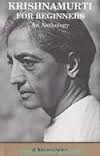What do you think?
Rate this book


240 pages, Hardcover
First published January 1, 1995
Intelligence is the comprehension of the whole process, the total process of life, not knowledge of one fragment of life.
Wisdom doesn't lie in books, nor in experience, nor in following another, nor in repeating a lot of platitudes. Wisdom comes to a mind that is understanding itself, understanding how thought is born."
To break down the prison meant facing an often painful immediacy of 'what is' rather than chasing an often illusory promise of 'what should be' in some distant future."
Love is neither personal nor impersonal; it is a state of being. It is not of the mind; the mind cannot acquire it. You cannot practise love, or through meditation acquire it. It comes into being only when there is no fear, when this sense of anxiety, loneliness, has ceased, when there is no dependence or acquisition. And that comes only when we understand ourselves, when we are fully cognizant of our hidden motives, when the mind can delve into the depths of itself without seeking an answer, an explanation, when it is no longer naming.